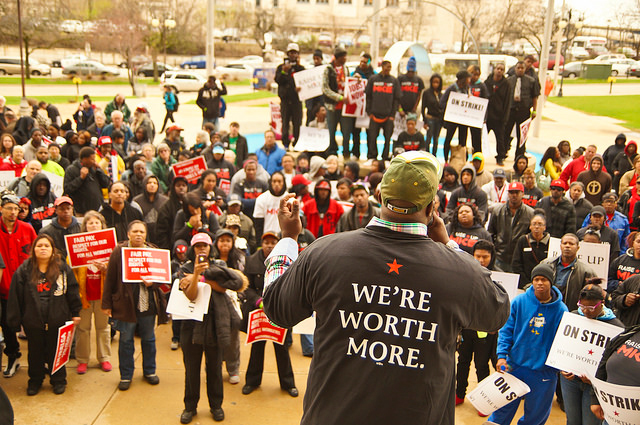
On February 18, labor unions have called for a global day of action in support of the right to strike in advance of a key meeting of the governing body of the International Labor Organization (ILO). It will consider a proposal to refer a contentious dispute between the worker and employer groups about whether or not the right to strike is enshrined within the core Convention on Freedom of Association and Protection of the Right to Organize (Convention 87), to the International Court of Justice (ICJ). The ICJ is the final court of appeal in disputes about the interpretation of ILO conventions.
Unions’ international day of action is a response to an unprecedented move by the International Organization of Employers (IOE) to undermine the legal basis for the right to strike. The workers’ group at the ILO and labor unions worldwide want the governing body to refer the dispute to the ICJ, but employers and several government members are opposing this, including the United States, Russia, China, Iran, the United Arab Emirates and Zimbabwe.
The dispute first erupted at the ILO in 2012. For the first time since 1926, employer groups blocked discussions on the worst cases of violations of workers’ rights. They blamed the impasse on the decision of the Committee of Experts – an independent body of 17 legal analysts charged with examining the application of ILO conventions and recommendations – to give an interpretation of the right to strike under Convention 87 in its annual report. The Committee of Experts subsequently refused to backtrack from its position that the right to strike is enshrined in existing ILO conventions in its 2014 report.
Contrary to several decades of accepted jurisprudence, the IOE claims that Convention 87 is silent on the right to strike and thus the Committee of Experts has no mandate to express their view on the issue. The IOE claims that Convention 87 neither contains nor implicitly recognizes any right to strike, and that the right to strike is a matter of national labor law. According to International Trade Union Confederation General Secretary Sharan Burrow, this position threatens “the fabric of modern industrial relations and the very role of the ILO.”
Canadian Supreme Court Protects the Right to Strike
Recent developments in Canada provide a stark contrast with the IOE’s unsupported position on the right to strike. In January, Canada’s Supreme Court reaffirmed the right to strike to be fundamental and protected by Canada’s Charter of Rights and Freedoms, ILO conventions and various other international treatises, effectively refuting the employer position.
The Supreme Court recognized the right to strike as an essential part of the collective bargaining process. Strikes are not independent of the right of collective bargaining, the court ruled, but an integral element of the system of collective bargaining. The court threw out legislation enacted by the provincial government in Saskatchewan that had eliminated the right to strike for certain public sector employees. It recognized that if workers cannot withhold their labor as a last resort, collective bargaining could not be “meaningful” and workers would be powerless.
Undermining the Right to Strike in the United States
In the United States, employers’ use and threatened use of permanent replacements has effectively undermined the right to strike in the private sector over the past several decades. Employers have a legal right to permanently replace, but not to fire, workers who participate in lawful economic strikes. This technical distinction means little to strikers who have been permanently replaced. As well as weakening workers’ bargaining power, employers use the threat of permanent replacement to undermine union organizing campaigns.
As a result of this lack of protection, the number of US workers participating in economic strikes has plummeted. In 2014, the number of major stoppages and the amount of work time lost declined to the second-lowest level since the Department of Labor started collecting data on work stoppages in 1947. Last year saw only 11 stoppages involving 1,000 workers or more, and it was the sixth consecutive year that lost workdays accounted for less than 0.005 percent of all workdays.
The situation is not much better in the public sector. In many states, public workers are prohibited from bargaining. In 2007, the ILO’s Committee on Freedom of Association (CFA) ruled that a North Carolina law prohibiting public sector bargaining violated workers’ fundamental rights. And some states that permit bargaining severely restrict public workers’ right to strike. In 2010, the CFA ruled that the draconian penalties against illegal strikes under New York State’s Taylor Law were inconsistent with international standards on freedom of association.
Since 1947, 153 countries have ratified ILO Convention 87. The United States is not among them, but as an ILO member, it is obliged to “respect, to promote and to realize” the principles contained in the 1998 Declaration on Fundamental Principles and Rights at Work, which includes freedom of association and, therefore, the right to strike. While not in the same category as the most repressive regimes in which workers have no right to strike – such as North Korea, Qatar, Saudi Arabia and the UAE – the United States clearly fails to protect workers’ right to strike under international labor and human rights standards. The ICJ must ensure that employers are not able to eviscerate the right to strike globally.
Join us in defending the truth before it’s too late
The future of independent journalism is uncertain, and the consequences of losing it are too grave to ignore. To ensure Truthout remains safe, strong, and free, we need to raise $46,000 in the next 7 days. Every dollar raised goes directly toward the costs of producing news you can trust.
Please give what you can — because by supporting us with a tax-deductible donation, you’re not just preserving a source of news, you’re helping to safeguard what’s left of our democracy.